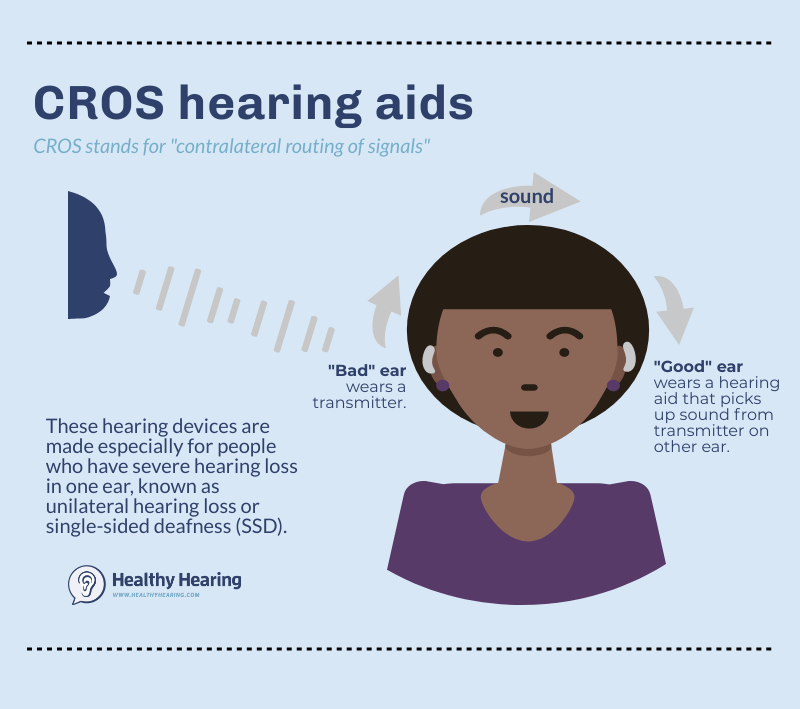|
www.HealthyHearing.com |
What are CROS and BiCROS hearing aids?These hearing aids help people with single-sided deafness
Contributed by Temma Ehrenfeld CROS hearing aids are specialized hearing aids that are developed specifically for people with unilateral hearing loss, or hearing loss in one ear. The acronym stands for Contralateral Routing of Signals. How CROS hearing aids workWith a CROS hearing system, you wear a transmitter on the "bad" ear that picks up sound. On the "good" ear, you wear a receiver and a microphone. They deliver the transmitted sound from your bad ear into your good ear. This system gets rid of an auditory problem known as the “head shadow” effect. What is the head shadow effect?Incoming sound on the side of your bad ear is blocked and distorted by your head. It can't reach your good ear. Audiologists call this the “head-shadow effect." It tends to affect consonants more than vowels. Meaning, when you can’t hear from one ear, it will be especially hard for you to distinguish words like “cat” from “hat.” This is even harder in noisy places. Fortunately, there are solutions, ranging from specialized headphones to CROS hearing aids to surgical implants.
What are BiCROS hearing aids?BiCROS are very similar to CROS hearing aids, except they're designed for people who have hearing loss in their "good" ear, too. With a BiCROS system, the aid in your better ear will also be programmed for any amplification you may need. The “Bi” stands for Bilateral. Who is a candidate for CROS and BiCROS?You are a candidate if one of your ears is particularly bad or has no hearing at all. About 60,000 people in the United States develop this problem every year. The cause might be a viral infection, getting hit on the head, a shortage of blood to the auditory pathway, or a benign tumor, called an “acoustic neuroma,” on the nerve that connects the ear to the brain. Another cause is Ménière's disease, when fluid builds up in part of the inner ear. For example, teacher Carly Sygrove, shared her story of single-sided deafness most likely associated with Ménière's disease. While she tried a pair of CROS hearing aids, she said she is still deciding on a treatment option. If you suspect a medical cause for your hearing loss, promptly see an ear, nose, and throat doctor. You may need laboratory testing to rule out inflammatory or infectious causes. If you lost your hearing suddenly, you may be advised by your ENT to take steroids. More: Sudden hearing loss in one ear? Don't wait to get treatment If your condition can’t be treated medically, your next step is to speak to an audiologist about your options, including CROS and BiCROS. Similar to standard hearing aids, CROS and BiCROS can operate on batteries or are available as rechargeable devices. Bone-anchored hearing systems and cochlear implantsIf you have single-sided deafness and another problem—like chronic ear infections or allergies to ear molds—you may need a bone-anchored hearing system or a cochlear implant. Find out more about bone-anchored hearing and single-sided deafness and how cochlear implants work. Drawbacks to CROS hearing aidsCROS hearing aids take time to get used to, and it's important to know they will not solve all the hearing problems a person may have. For example, they do not improve "localization" of sound—a person may still not know where a sound is originating from. This can be especially frustrating in an environment with a lot of background noise, which will be amplified by the devices. What can I do to improve my chance of adjusting well?While getting used to them can be challenging, the most important thing a person can do is wear their CROS aid as much as possible, experts say, and not give up too quickly. “Use the device full time—all waking hours—in order to get used to this listening arrangement. It is very different from what anyone is used to and it will take time to adjust,” notes Catherine Palmer, former president of the American Academy of Audiologists. Temma EhrenfeldTemma Ehrenfeld is an award-winning journalist who covers psychology and health. Her work has appeared in major newspapers, magazines and websites. You can find more of her writing at her Psychology Today blog, Open Gently. Read more about Temma. |
Featured clinics near me
Hearing Health Solutions from Ohio ENT - Columbus
974 Bethel Rd Ste B
Columbus, OH 43214
Earzlink Hearing Care - Reynoldsburg
7668 Slate Ridge Blvd
Reynoldsburg, OH 43068

Find a clinic
Need a hearing test but not sure which clinic to choose?
Call 1-877-872-7165 for help setting up a hearing test appointment.


